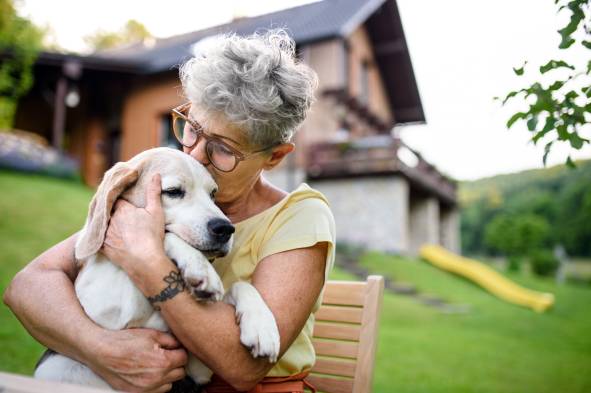Connect with a verified veterinarian in minutes. Licensed vets are available 24/7 to answer your questions. No need to worry about your furry family member.
70% of US households, or around 90.5 million families own a pet, according to the 2021—2022 National Pet Owners Association Survey that was conducted by the American Pet Products Association (APPA). However, for those who are nearing retirement, choosing the right pet for your new lifestyle can be a daunting endeavor. From the mental health benefits of owning a pet to how your needs can play a major role, here’s what you should consider before adopting.
The benefits of owning a pet during retirement
There are many reasons why owning a pet later in life can be beneficial. For example, pets can provide companionship, a sense of purpose for those who are newly retired, and can promote calmness as well. Additionally, having a pet at an older age can aid in staying active, and can even keep you from becoming socially isolated, an issue that many in retirement may face with a newly freed up schedule.
It’s important to realize that the therapeutic value of having a pet is continually backed by experts. June McNicholas, academic and psychologist, notes that pets can actually provide a lifeline for those who may struggle with social isolation. “Pet care and self-care are linked. When you take a dog out for a walk, people talk to you and that may be the only social contact an isolated person has the whole day,” McNicholas notes, further stating “When pet owners leave the house to buy pet food, they’re more likely to buy food for themselves and when they feed their pet, they’ll sit down to eat too.” McNicholas goes on to further note the benefit that pets can have for individuals who may experience disabilities, thanks to the pet’s ability to break down barriers — thus allowing for a more natural and comfortable interaction among other people.
How your needs factor in
As an older adult nearing retirement, it’s imperative to consider your personal needs before adopting a pet in order to ensure you’re choosing the right one that will mesh well with your new lifestyle. Whether you plan to be extremely active and involved within the community or anticipate a calmer lifestyle spent primarily at home, choosing a pet that you’ll have the time and ability to properly care for is essential. For instance, while a calmer lifestyle may allow for pets with higher maintenance (such as a dog, which will require regular walking, etc.), owning a pet fish or other low maintenance pet will allow you to experience the benefits of having a pet with a more flexible care routine.
Your personal needs in terms of mobility and physical limitations are another important aspect of determining which pet may work better for you throughout retirement as well. For example, if you experience mobility issues, you may not be able to keep up with regularly walking an active dog breed (like a golden retriever) several times a day. Similarly, caring for a puppy can be a difficult endeavor as well when considering the high level of care they involve, as can one with extensive grooming needs. Instead, opting for an animal like a cat, or a calmer, short haired dog breed (such as a french bulldog) can ensure you’re adopting within your limitations.

Review symptoms, medications & behavior to keep your pets healthy with a Vet Online in just minutes.
Ask a Vet Live NowWhen you should consider a service pet
For some seniors, a service animal like a service dog may provide a better solution over a regular pet, especially since they can be helpful for those who experience a disability. With service dogs defined as “dogs that are individually trained to do work or perform tasks for people with disabilities,” according to the Americans with Disabilities Act (ADA), these pets can provide help in numerous different ways. From guiding the blind to alerting the deaf, service dogs can aid with other tasks as well, such as pulling wheelchairs, reminding those with mental illness to take prescribed medications, and even calming those with post-traumatic stress disorder (PTSD) during an anxiety attack. However, it’s important to keep in mind that there are criteria that one must meet in order to obtain a service animal — for starters, you must have a physical or mental disability that affects your day to day life, and be able to show that the animal can provide a service that will benefit your illness.
Choosing to adopt a pet as an older adult entering retirement can be exciting, though there are several considerations to keep in mind before jumping in and adopting straight away. From how your needs must fit in with a pet’s care to when you may need to consider a service animal, taking such aspects into account beforehand will ensure that you’re getting the right pet for you and your lifestyle.
Connect with a verified veterinarian in minutes. Licensed vets are available 24/7 to answer your questions. No need to worry about your furry family member.

Tom
Tom has always loved to write since he was little - he wanted to be either a writer or a veterinary doctor, but he ended up being a professional writer while most of his works are based on animals. He was born in San Francisco but later moved to Texas to continue his job as a writer. He graduated from the University of San Francisco where he studied biotechnology. He is happily married and a soon to be father!
Review symptoms, medications & behavior to keep your pets healthy with a Vet Online in just minutes.
Ask a Vet Live Now

